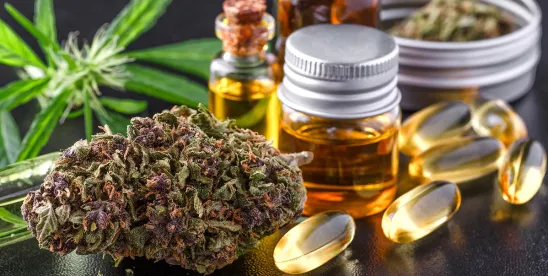- Dispensaries and retailers may face potential liability under the New Jersey Product Liability Act (NJPLA) for alleged design defects or failure to warn.
- Hypothetical and speculative future losses are not sufficient to allege an ascertainable loss under the New Jersey Consumer Fraud Act (NJCFA).
- New Jersey’s innocent seller statute provides a strong defense, if its requirements are followed.
In the Monmouth County (N.J.) Superior Court, a judge denied a motion to dismiss product liability claims brought by a track and field athlete who alleged that consumption of high-potency, THC-based products led the plaintiff to experience psychotic episodes and attempt suicide. The plaintiff claimed that the retailers “knew or should have known” the risks and failed to adequately warn consumers.
Overview of Claims
The plaintiff sued numerous CBD/THC dispensaries and stores carrying similar products in Monmouth County, alleging claims for: (1) violation of the New Jersey Product Liability Act (NJPLA) for design defect and failure to warn; (2) violation of the New Jersey Consumer Fraud Act (NJCFA); and (3) punitive damages.
The core allegation was that dispensaries and retailers did not adequately disclose the alleged potential dangers associated with consumable edibles and disposable vape devices. Specifically, the plaintiff alleged that defendants failed to disclose that consumption of “high-potency THC concentrates” could result in “hallucinations or psychosis.”
Court's Ruling on Motion to Dismiss
The retailer defendants moved to dismiss the plaintiff’s NJPLA claims, citing immunity under New Jersey’s innocent seller statute (N.J.S.A. 2A:58C-9). Under this statute, a product retailer who did not exercise significant control over the design, manufacturing, packaging or labeling of the product, is immune from liability if the retailer files an affidavit identifying the product’s manufacturer, with certain exceptions.
The court held that the retailer’s affidavits under the statute were deficient for two reasons: (1) there was insufficient evidence that the manufacturers could be served or satisfy a judgment; and (2) the affidavits did not present sufficient evidence that the retailers were without knowledge of the alleged defects in the products.
The retailers also argued for dismissal of the NJPLA claims, stating the complaint failed to identify any product defect or allege that the products were the proximate cause of the plaintiff’s alleged injuries. The court, applying New Jersey’s liberal standard at the motion to dismiss stage, held that the plaintiff’s complaint alleged sufficient facts to support the NJPLA claims.
The retailers also sought dismissal of the NJCFA claims on the basis that the plaintiff failed to allege an ascertainable loss. The plaintiff argued that the allegations of “hypothetical future pain and suffering, and hypothetical future medical expenses” were sufficient to plead an ascertainable loss. The court held that potential future endorsements or winnings from his professional athletic career were too speculative and were “not quantifiable or measurable damages.” Therefore, the plaintiff failed to allege a claim under the NJCFA.
Finally, the court dismissed the plaintiff’s claim for punitive damages, noting that under New Jersey law, punitive damages are a remedy, not an independent cause of action. The court clarified that while there is no separate claim for punitive damages, the plaintiff may seek such damages if they ultimately prevail on NJPLA claims.
Takeaways
Cannabis has been legal in New Jersey since the state’s Constitution was amended after the 2020 election. This decision serves as a reminder that despite legalization, cannabis retailers may still face product liability claims under certain tort theories. Compliance with the requirements of New Jersey’s innocent seller statute is key when seeking the benefits of its immunity from liability.





 />i
/>i
